Pocket pets are fun. Gerbils specifically are known to make good companions. There are many things to keep in mind when deciding to get a gerbil. Some of these facts may even surprise you. Read below to learn some!
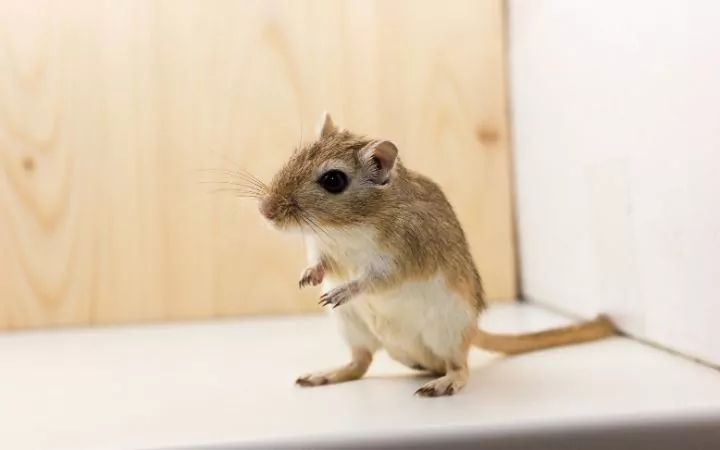
What is the difference between a gerbil and a hamster?
A lot of people confuse gerbils and hamsters. Some people even think they are the same thing and use the name interchangeably. However, there are a few differences between the two, and they are, in fact, two different animals.
First, let’s discuss physical differences. Hamsters are short and stubby, and gerbils tend to have longer bodies and longer snouts. Both animals have a range of colors and hair coat types. Perhaps their most significant differences lie in their behavioral traits. Gerbils are friendlier than hamsters, and therefore usually make better companion animals.
Gerbils like to burrow and are very interested in their humans. Unlike hamsters, they are not nocturnal (staying awake during the night) or truly diurnal (staying awake during the day). They tend to keep to their humans’ schedule and like to be handled. Hamsters are nocturnal and do not mind being handled, but it has to be on their terms. Hamsters can be territorial and prefer to be alone, where gerbils usually do well in pairs.
Now that you know some of the main differences between gerbils and hamsters, let’s highlight and discuss some fun facts about gerbils!
Gerbils are Bald, Blind, and Deaf when Born
Gerbils are born hairless without the ability to hear or see. This makes it imperative that they have their parents to guide them until they mature. Without mom, they will not make it, which brings us to our next fun fact.
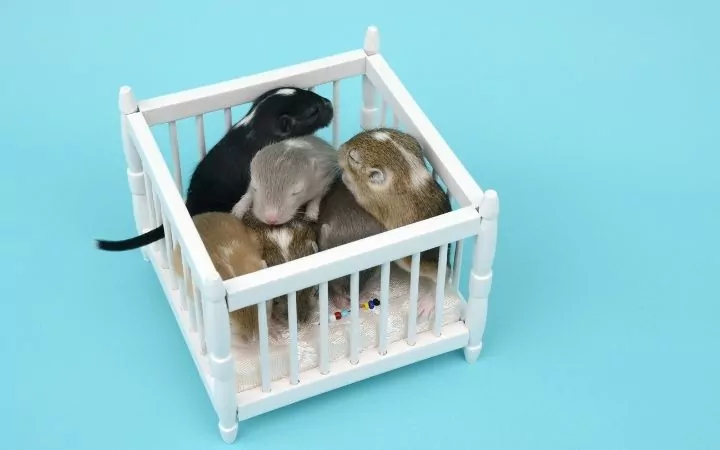
Gerbils Make Great Parents
Gerbils are great at teaching their young how to survive in the wild. Unlike many other breeds, Gerbil fathers stick around and are heavily involved in bringing up their pups. Both parents teach them how to gather supplies, clean themselves, and make appropriate nests.
Gerbils Thump
When gerbils are excited or stressed, they will thump their hind legs. They can do it to communicate with other gerbils to warn them of danger or predators. Thumping is often contagious, and if one gerbil starts, the next one will begin to thump as well. If you are in the presence of a clan of gerbils, you may see a whole drumline take place from their tiny feet.
Gerbils Tails are Multi Purposeful
Gerbils have tails as long as their body to help keep them balanced. They can also help keep the animal cool by removing heat from their bodies and can store extra fat. Gerbils can even lose or “slip” their tails when they’re in danger. Going off when they were in the wild, gerbils are prey for many animals.
As they attempt to run away, these predators will grab their tails in order to grab them. The gerbils, in turn, will slip their tail as a defensive mechanism. This means that their skin will slip off, leaving the predator with an appetizer vs. the whole gerbil meal. The gerbil gets away, but they are left with a severe injury.
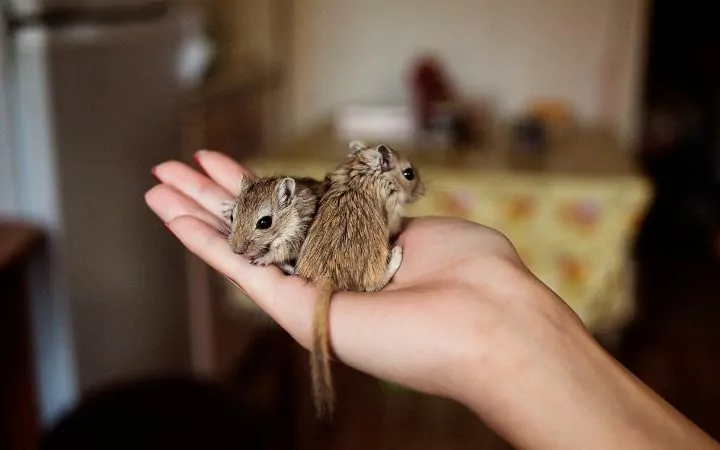
When it comes to domestic gerbils, tail slips can happen due to poor handling. If you take anything away from this article, make sure you do not handle your gerbil by its tail. If its tail does slip, contact your veterinarian immediately for medical care and advice.
They are Desert Animals
Gerbils are native to the deserts of Africa, Asia, and the Middle East. They are actually also known as “desert rats.” They like dry, warm areas and burrow into the ground to keep safe from weather and predators.
They Love to Burrow
Gerbils are burrowers. If you’re ever looking to break out of jail, take a page out of a gerbils book. They’re basically escape artist geniuses with the way they build tunnels and underground systems. Some are so intricate that they can lead them to and from food stores. When owning a domesticated gerbil, it is essential to provide them with toys and bedding that allows for this.
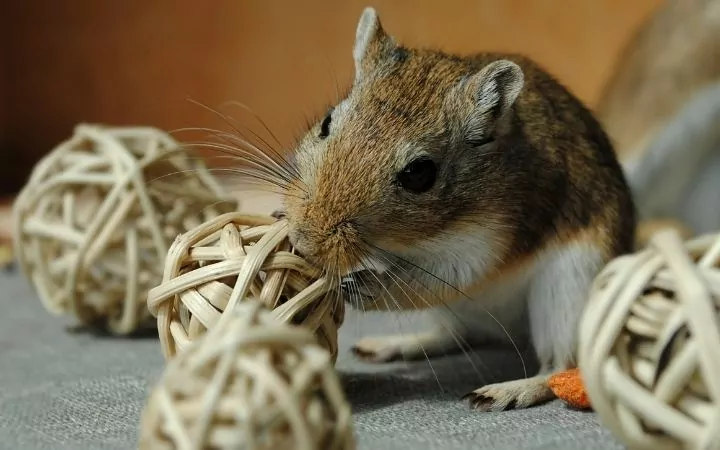
Their Teeth Continually Grow
The incisors in the mouth of the gerbil will continuously grow. The reason behind this growth is that tooth tissue is continually developing. Providing them with proper toys and food to grind their teeth is extremely important to their overall health. If they fail to grind down their teeth, they will need to have them manually cut by your veterinarian. You should never cut them yourself because you could hurt them. If you cut them too short, it will affect their eating habits.
Great Jumpers
When scared, gerbils are known to jump very high due to their strength in their hind legs. In the wild, this happens less often because they are mainly on the ground scavenging and will burrow to escape predators. However, domestic gerbils do not have any place to run and will jump out of fright.
Sand Baths
Instead of water, they prefer the dry sand to remove any dirt, parasites, or foreign bodies. This is essential to their hygiene. Gerbils usually require a dust bath once to twice a week but should be offered to them more if needed.
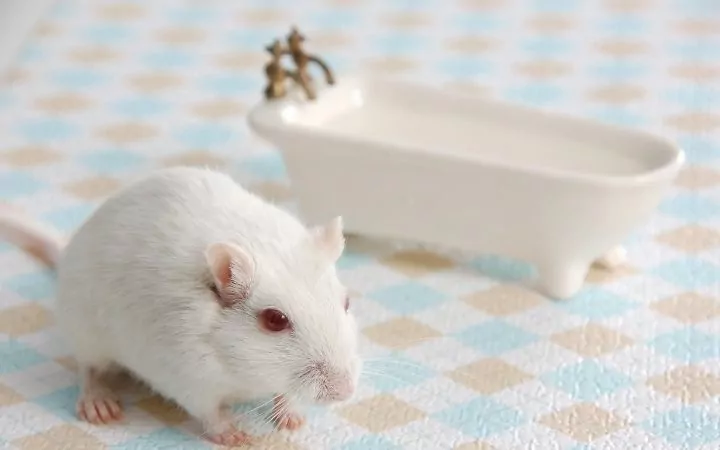
Pregnant Right Out the Gate
These little creatures are usually monogamous (aww) and are able to get pregnant as early as two months old! They chase, smell, and then mount to mate, and pregnancy lasts for about 24 days. Gerbils can produce anywhere from one to eight pups and can get pregnant again as soon as they give birth.
Rarely Urinate
Husbandry is your primary responsibility when keeping a small companion pet such as a gerbil. What makes them unique is that they rarely urinate, which allows for a much cleaner cage (and happier owner). Being from dry environments where water is scarce, they tend not to drink a lot, which results in less urination. Of course, they do need water, though, so they extract most of it from their food. Their kidneys are even evolved to retain as much fluid as possible.
Social
Gerbils are social butterflies! They love their owners and are known to recognize their faces. They love to play, be around, and even cuddle other gerbils. Getting to know your gerbil is essential in their social lifestyle but make sure you handle them correctly to avoid injury. A happy gerbil runs, plays and exercises, so seeing all these signs means you’re doing a good job.
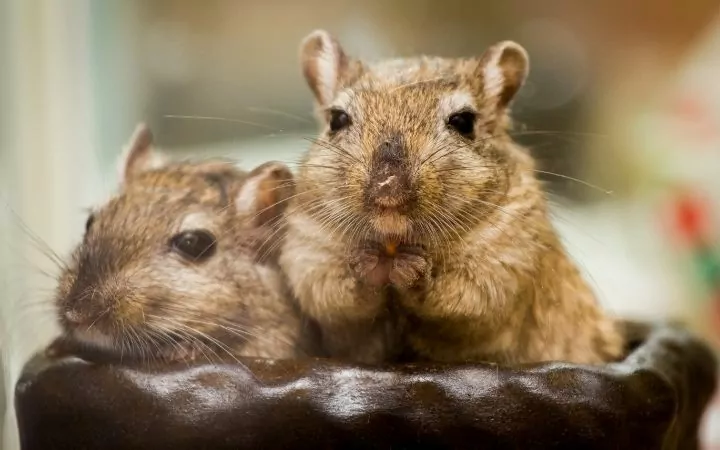
Summary
Gerbils are fun, loveable, fearless little creatures. They can make amazing companions and are best in pairs. Their small bodies and easy care make them great family animals, but there is a lot to learn about them. Gerbils are interesting, and have a lot to offer.
